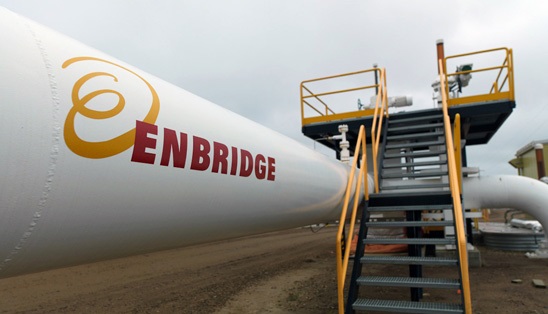
The U.S. Supreme Court agreed on Monday to hear Enbridge’s bid to change the venue of Michigan’s lawsuit seeking to force the Canadian pipeline operator to stop operating a pipeline underneath the Straits of Mackinac, waterways linking two of the Great Lakes, over environmental concerns.
The justices took up Enbridge’s appeal of a lower court’s ruling rejecting the company’s request to move the case from state court into federal court, a venue generally considered more friendly to defendants in such cases.
The Supreme Court is due to hear the case in its next term, which starts in October.Calgary-based Enbridge has been locked in a long-running dispute with Michigan over the aging Line 5 pipeline, which ships 540,000 barrels per day of crude and refined products from Superior, Wisconsin, to Sarnia, Ontario.
A four-mile (6.4-km) section of the aging pipeline runs underwater through the Straits of Mackinac, which connect Lake Michigan and Lake Huron, and environmentalists are concerned about the risk of an oil leak.
The Cincinnati-based 6th U.S. Circuit Court of Appeals last year ruled that Enbridge waited too long to seek to have the lawsuit that was brought by Democratic Attorney General Dana Nessel in June 2019 removed to federal court when it tried to do so in November 2021. The lawsuit sought to enjoin Enbridge’s continued operation of Line 5 based on alleged violations of state public nuisance and environmental laws.
Nessel’s office in court papers described the 6th Circuit’s ruling as the correct result in a case in which Enbridge missed by more than two years the statutory deadline to try to transfer the litigation to federal court.
Enbridge’s lawyers in a petition to the Supreme Court said that the 6th Circuit’s ruling added to a split within the regional U.S. appeals courts over whether the judiciary can create exceptions for a 30-day time limit to seek to remove cases filed in state court to federal court.
That split has created untenable uncertainty in the law that resulted in defendants in some parts of the country being subject to the strict deadline while others were not, Enbridge told the Supreme Court. The U.S. Army Corps of Engineers last month said it expects to make a decision this fall on whether to grant a permit to Enbridge’s proposal to build a tunnel to house the Line 5 pipeline. In April, Enbridge’s Line 5 project received emergency designation after President Donald Trump declared a national energy emergency in a January executive order, giving the Army Corps the ability to fast-track its review of the project.
Nessel filed the lawsuit in state court in Ingham County. While that case was being actively litigated before a state court judge, Michigan Governor Gretchen Whitmer, a Democrat, in November 2022 revoked an easement that allowed the pipeline to be operated and filed a lawsuit to enforce the revocation.
Enbridge succeeded in getting that case transferred from state court to federal court, having argued that Whitmer’s state-law claims raised federal questions related to foreign affairs and were potentially preempted by the federal Pipeline Safety Act and the Submerged Lands Act.
A federal judge rejected Whitmer’s bid to remand the case to state court in November 2021. Based partly on that order, Enbridge a month later moved to have Nessel’s earlier lawsuit also transferred to federal court.
Enbridge argued it could transfer the case 887 days after receiving Nessel’s lawsuit based on a provision of the statute governing case removals that allows a case to be removed 30 days after an order from which it could be first determined a case could be heard in federal court.
(Reporting by Nate Raymond in Boston; Editing by Will Dunham)
Share This:




 CDN NEWS |
CDN NEWS |  US NEWS
US NEWS 


























